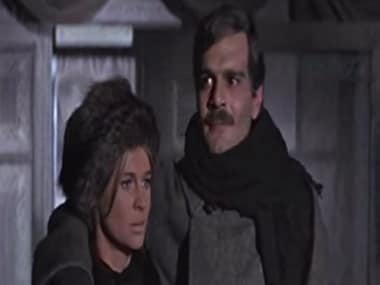So in the end Old Father Time came for Omar Sharif a little after his co-actor, Peter O’Toole. Both men memorably co-starred in the 1962 film Lawrence of Arabia and died within a while of each other. Sharif’s achievement was crossing a cultural divide in an age when this was rare. From the cultivated Christian aristocracy of Egypt, he effected a certain debonair cosmopolitanism, reminding the world that there was another sort of Arab out there, far removed from the stereotype. Fluent in multiple languages, like that other member of that milieu, Boutros Boutros Ghali, he moved easily in many worlds. His life story had the carousing and revelry that was expected of a star of that era. But there was also the second wind in the highly intellectual game of contract bridge. His was a career that took off and peaked in the sixties, and all at the same time. But he will always be remembered only for two roles. The first was as Sherif Ali of Mecca in David Lean’s Lawrence. The second – and this writer’s preference – was the eponymous role in Lean’s other film, Dr Zhivago, the big screen adaptation of poet Boris Pasternak’s novel. [caption id=“attachment_2362754” align=“alignleft” width=“380”]  Omar Sharif. Image from Facebook.[/caption] Zhit in Russian is to live, and z_hivago_ means “the living”. Pasternak’s first and only novel was a reprise for an older Russian culture, brutalised but not destroyed, by the mechanical and materialistic Soviet machine_._ In Zhivago, Pasternak created a passive sufferer and gave him a credible inner life; it was an ideal far removed from, and therefore a threat to, the regime’s view of home sovieticus, and that genus’ concern for the social collective. “Your leaders speak many words but you forget the most important – that you cannot love by force”, Zhivago tells the Bolsheviks of 1919. Communist cultural bureaucrats were predictably ruthless in their denunciation, calling Pasternak “worse than a pig, because even a pig will not befoul the place where it eats and sleeps.” Smuggled out of the Soviet Union as samizdat – or dissident – literature, it was published to widespread acclaim in 1957. It was, Pasternak would say, “my chief and most important work, the only one of which I am not ashamed, and for which I take full responsibility.” The book itself was replete with hidden imagery and symbols, many of which Lean did not capture in the movie. But the film Dr Zhivago, and Sharif’s role, went on to become epics, reminding one of what going to the movies was all about in another era. Setting a romance against a major historical event was a formula Titanic was to repeat later. With both, it sort of all came together. Yet, critics panned the movie when it first appeared. Slavophiles, if there are any nowadays, would note that the events of the Russian Revolution, and its meaning for the Russian future were simply not covered. Critics like Roger Ebert saw Sharif as “bewildered and dazed”, in his role as a doctor and poet in love with another man’s wife against the sweeping backdrop of the Russian Revolution. The New York Times noted a “strange passivity”. “He takes all its cruel oppressions with a solemn, uncomplaining wistfulness”, was its description of the doctor’s reactions to the revolution that tears him away from a promising practice and a dutiful wife, and involves him with Lara, the former wife of a Communist revolutionary, herself a peculiar and ambiguous combination of beauty, integrity, spirit, and sensuality. Yet Sharif pulled of the essence of the character in the novel. That essence, as Pasternak saw it in 1954, when he published 10 poems from it as a prelude, was to deal with a “thinking man in search of truth, with a creative and artistic bent”. It was a combination of two powerful archetypes in 19th century Russian literature: the obyvatel or the oppressed little man, and the lishniy chelovek, or the superfluous man. The obyvatel was literally just an inhabitant, a non-entity whose prime characteristic was passivity, watching the misfortunes fate sent his way. The lishniy chelovek, the superfluous man – often an aristocrat - was incapable of effective action, living a life of alienation and sophistication far removed from Russian reality. Sharif’s enactment of the role was truer to Pasternak’s creation of a passive sufferer with a deep inner life, but that portrayal came across negatively to the critics. The film itself, made for a worldwide - which in those days meant predominantly Western - audience, simply could not deal with the complexity of the novel. But again it was not meant to. In fact, the novel was a poem in prose, the mirror of Pushkin’s novel in verse Yevgeny Onegin. Critical misreckoning was not confined to Sharif’s role. Maurice Jarre’s score described as “fustian and sentimental”, went on to become one of the most recognised pieces of music in the century. The critics were to be proved wrong. Both the movie,and Sharif’s role in it, are of the living. Adil Rustomjee is an investment adviser in Mumbai. Comments are welcome at a_rustomjee@hotmail.com .
Omar Sharif, who passed away last week, immortalised his acting career with his roles in Lawrence of Arabia and Dr Zhivago - the latter more than the former
Advertisement
End of Article
Written by Adil Rustomjee
Adil Rustomjee is an investment advisor in Mumbai. Sensible comments are welcome at a_rustomjee@hotmail.com see more


)
)
)
)
)
)
)
)
)



